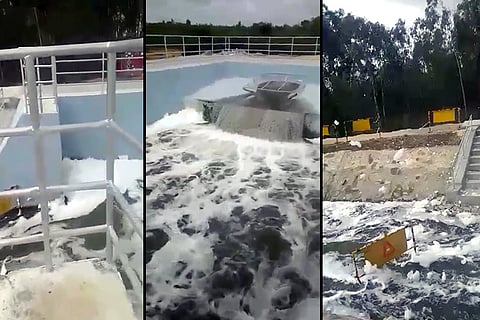

Activists in Kolar are threatening to send 'foam water' to legislators from their district. This after the controversial Koramanagala-Challaghatta (KC) Valley Project released ‘treated’ but frothy water from Bengaluru’s lakes and sewage.
Activists say they want legislators, who have been silent about the issue to "get a feel of the water being released".
The froth in the water was observed in the water released to Lakshmisagara Tank in Kolar on Wednesday, as part of the KC Valley project, which was introduced to solve the water woes of the district by releasing treated water from Bengaluru.
"It has been two days since the incident occurred but not even a single MLA has come out and questioned the project. Those who have noted that a problem has happened have only assured that it will not happen again," says Kurbarapet Venkatesh, an activist from the Shashwatha Neeravari Horata Samiti.
The activist is adamant that they will make good on their promise and send one tanker each of froth-filled water to the houses of legislators in Kolar. They say that their apprehensions about the project were dismissed by legislators and engineers in the Minor Irrigation Department but believe the froth observed in the water vindicates their fears of receiving polluted water as part of the project.
Kolar has six Assembly constituencies - Malur, Mulbagal, Bangarpet, Kolar, Srinivaspura, Kolar Gold Fields.
Water was first released to tanks in Kolar as part of the project on June 7. However, activists are already up in arms over the fact that secondary treated water is being sent and instead want tertiary treated water to be sent or the project to be stopped altogether. Secondary wastewater treatment processes remove waste organic (once living, biological) material from wastewater, typically using a biological treatment process. Tertiary treatment is the last step in basic wastewater management which is mostly comprised of removing phosphates and nitrates from the water supply. There is a common belief that only tertiary treated water can be used for general purposes
So far around six tanks have received water as part of the project while it aims to fill 126 tanks in Kolar and Chikballapura.
Anjaneya Reddy, also a member of the Samiti, filed a Public Interest Litigation on June 18 questioning the government's decision to go ahead with the project in spite of several studies opposing it. The PIL will come up for hearing in the Karnataka High Court on Monday.
Anjaneya highlights a study by TV Ramachandra of the Centre for Ecological Sciences, Indian Institute of Science, which observed that, "Allowing partially treated water (water with nutrients and heavy metals) to fill the tanks in Kolar and Chikballapur districts would aggravate the water crisis in the region. The region being over-exploited block, the tank water infiltrates into groundwater resources rapidly leading to further deterioration of groundwater (which already has nitrate and fluoride contamination)".
Anjaneya further stressed that residents of Kolar and Chikballapur depended on groundwater for its drinking water needs. "The water released is being used to fill the tanks and for irrigation purpose. The water is also going to recharge groundwater levels in Kolar and residents depend on groundwater for their drinking water needs. We are trying to make sure that the groundwater is not polluted because once it is polluted then we cannot do anything about it," says Anjaneya.